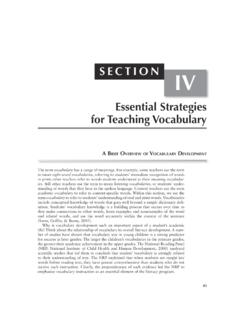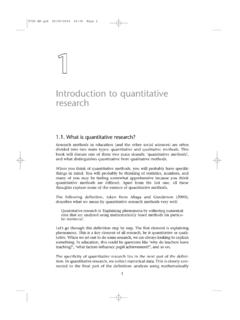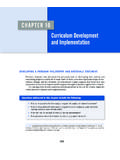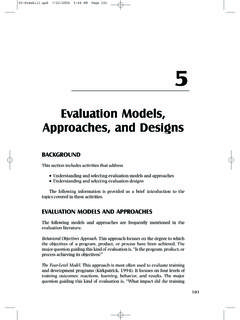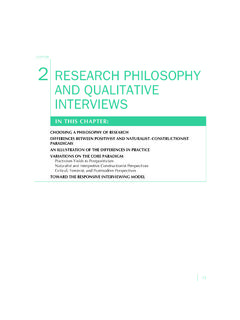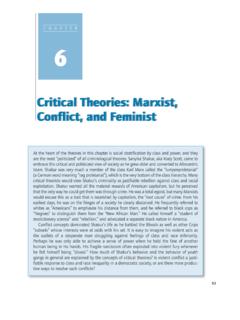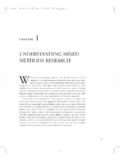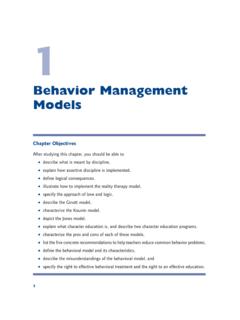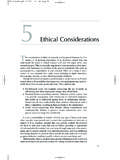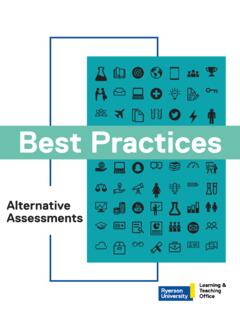Transcription of What is policing?
1 What is policing? 1 ContentsLearning objectives 3 Key terms 3 Introduction 3 Police and policing3 What is policing? 5A narrow, law enforcement approach6 The centrality of force to policing9 The practice of policing10 Police as bureaucrats13An institutional perspective15 Conclusion15 Chapter summary17 Self-check questions18 Study questions18 annotated further reading19 annotated listings of links to relevant 12/17/2007 8:17 PM Page 12/17/2007 8:17 PM Page 2 WHAT IS POLICING3learning objectivesMore than three decades ago, the American sociologist, Egon Bittner (1974: 17)observed that the police service was one of the best known but least understood of public institutions.
2 The numerous studies and accounts that have emerged inthe intervening period might mean that the police service is today even betterknown, although perhaps still less well understood. Crime and policing, includingallegations of malpractice and corruption as well as heroism and selflessness,continue to feature heavily in the press, and the TV schedules and cinemaprogrammes are replete with cop shows. Familiarity, however, should not beconfused with understanding, and this chapter aims to do the following: to outline different perspectives on what policing is; to give an overview of what the police service does; to distinguish between the relatively narrow activities associated with the institutionof the police service from broader social processes of policing in broader termsbureaucracy; crime control; information work; law enforcement; national identity; policeand policing; service role; sovereignty.
3 Use of forceintroductionIn Britain, perhaps more than most countries, the police service forms part ofthe historical landscape and the police officer is elevated to the status ofnational symbol and is a ubiquitous part of the cultural framework(McLaughlin, 2007a). Colls (2002) showed how rhetoric surrounding the law,and its application to all without fear or favour, played an important role in thevery development of the British state throughout much of the Middle , the law has often not been cast or applied in the interests of the wholepopulation, but mythological accounts can be powerful narratives that shapenational identity.
4 Loader (1997: 2) suggested that the police are a principalmeans by which English society tells stories about itself .. an interpretive lensthrough which people make sense or, and give order to, their world .police and policingBefore attempting to answer the question What is policing? a few points ofclarification need to be made. Most important is the need to 12/17/2007 8:17 PM Page 3between the narrow set of functions performed by the institution of the policeservice and the broader processes of social regulation and reproduction thatgovern everyday lives. The wider account of policing as a social functionstresses that many institutions that do not have any formal role in the regula-tion of social life in practice contribute to the development of social norms andstandards of behaviour that underpin the ordinary social interaction of every-day activity.
5 The word policing is etymologically related to politics , thegovernance of the city or state, and was used in broad terms to signify socialregulation in the widest sense. Box outlines the development of the term. Policing did not come to be associated with the particular activities of aspecific institution (thepolice) until relatively recently in many societies. Thehistorical development of the police in Britain is described in the next chapter,which shows that demand for a particular organization to police society emergedin Britain during the eighteenth changing meaning of policing The Greek politeiameant all matters affecting the survival and well-being of thestate (polis).
6 The word and the idea were developed by the Romans (the Latinpolitiacan be translated as the state), largely disappeared with their Empire, butwere resurrected in the medieval universities to justify the authority of a prince overhis territories. By the early eighteenth century in continental Europe la policeanddie Politzeiwere being used in the sense of the internal administration, welfare,protection, and surveillance of a territory. The word police was not popular inEngland as it smacked of absolutism .. but the word was increasingly usedtowards the end of the eighteenth century. (Emsley, 1996: 3)Schools provide a good example of the broader process of social regulation asthey play a central role in the socialization of young people by preparing themfor adult life.
7 This is not the primary function of the education system, ofcourse, but recent debates about the development of the study of citizenshipwithin schools indicates that preparing young people for their post-school livesis increasingly recognized as an important secondary role. For these reasons it isreadily apparent that the education system plays a central role in the policingof society, if that is conceived in terms of the broad process of social other agencies also contribute to this process in ways that are lessobvious: religious groups, health providers, and the business sector to takethree examples contribute in various ways to the organization of social lifeand so could be regarded as part of the process of policing.
8 Some might argueINTRODUCTION TO 12/17/2007 8:17 PM Page 4that the media plays a central role in shaping subjective interpretations of theworld and the place of the individual within it and so are important agents ofpolicing in this wider sense. In Chapter 8 the increasing range of institutionsengaged in police networks are considered in more difficulty in thinking about policing in these broad terms is that it becomesdifficult to know where the category can be closed. It might be important torecognize that policing is not just the business of the formal police service andthat other institutions play a crucial role in developing , for example, publicperceptions of criminal or deviant behaviour, but the same could be said foralmost any and every aspect of social life.
9 For this reason, much of this bookwill focus on the narrow approach to policing and concentrate primarily onthe activities of the police service and so this initial discussion of What ispolicing? is also cast relatively narrow. Other agencies, both in the private andthe public sector, play an increasingly important role in the business of polic-ing and, where relevant, these are included in the discussion and analysis inchapters that follow. Since the police service cannot be understood in isolationfrom broader social developments the wider dynamics of policing are crucialto many of the topics featured throughout the book.
10 For the purposes ofunderstanding What is policing? , however, it is to the narrower role of thepolice service that the analysis now a narrow focus on the institution of the police raises the dilemma ofhow to answer the question, and two perspectives are taken here. This chapteraddresses the question literally by exploring what it is that the police do. Chapter2 explores the question in historical terms by charting the myriad factors thatled to the establishment of the modern police service in the nineteenth is policing? Attempts to define policing have focused upon the range of different aspectsof the diverse roles that the service performs.

